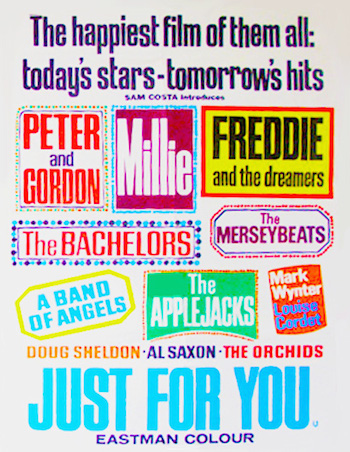Just For You – 1964 Sam Costa Film – Coventry Connections.
by Pete Clemons
Born 1910, Sam Costa began his
working life as a singer for big bands. Sam was also one of my Mum’s favourites.
As such I remember him for presenting ‘Housewives Choice’ on Radio 2 from 1967.
He also appeared of ‘Juke Box Jury’ and David Frost’s ‘Frost on Sunday
programme.
During 1964 Sam Costa appeared
in a film with several connections to Coventry within it. The plot to the film
is almost non existent really. Well, to be honest, there isn’t one at all. It’s
more a programme that showcases singing stars from the hit parade of the day
complete with Sam Costa’s interludes.
Throughout the movie DJ/agent
Sam lies in his other worldly computer operated bed. If there is a message then
it is that he is demonstrating all the trappings of success. The bed provides
him with all his needs. ‘This is the life’ he says. ‘All the wonders of modern
science at my beck and call, anything I want at the touch of a button’.
Another scene has Sam ranting
‘I’m not paying through the nose for all this guff for nothing you know’. ‘Its
amazing what you can do in bed. This bed does everything’. Between songs he has
this continual conversation with the computer which is trying to stir him into
life.
From his berth Costa
introduces: Faye Craig: “Bongo Baby” and “Voodoo.” The
Applejacks: “Tell Me When.” Al Saxon: “Mine All Mine.” Band
Of Angels: “Hide & Seek.” The Orchids: “Mr. Scrooge.”
The Bachelors: “The Fox” and “Low In The Valley.”
Freddie & The Dreamers: “You Were Made For Me” and “Just For
You.” Doug Sheldon: “Night Time.” Caroline Lee, Roy Stone and
Judy Jason: “Teenage Valentino.” Peter and Gordon: “Leave Me
Alone” and “Soft As The Dawn.” Millie Small: “Sugar
Dandy.” Jackie and the Raindrops: “Loco-Motion.”
The Warriors: “Don’t Make Me Blue.” Mark Wynter: “I Wish You
Everything.” Johnny B. Great: “If I Had A Hammer.” Louise
Cordet: “It’s So Hard To Be Good.” The Merseybeats:
“Milkman.”
From
that list you might just have spotted the Coventry associations. These of
course are The Orchids and Johnny Goodison. After The Orchids performance Sam
quips ‘The rumours that The Orchids helped me with my 11+ are totally untrue’
For the
American market, several of the UK musical performances were cut from the film.
Added however was new footage of US artists – including The Chiffons, The
Vagrants and The Rockin’ Ramrods. It was then released Stateside as ‘Disk-O-Tek
Holiday’.
Just For you is a feature
completely of it’s time. It is excellent quality, widescreen and in colour. At
the same time it is a incredibly priceless resource in as much that you get
rare footage of several not so well known crooners of the day.
It is futuristic in that the
film features a TV remote control as well as a huge wall mounted screen.
Lots of groovin, ravers and go
go dancing. Sam Costa did eventually get dressed but still lived life in bed.
The line of show was, for me, ‘have you got your weekend joint yet’? – Not sure
those days had arrived at that time but it really made me smile.


.jpg)
.jpg)
.jpg)
.jpg)
.jpg)


.jpg)













.jpg)
.jpg)
.jpg)